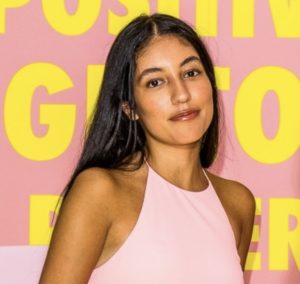Student Voice of Mental Health Award Winner Areli Rosales on the Power of Vulnerability
Areli Rosales has always felt it was her duty to help heal the people in her life. Growing up the child of an immigrant mother ...
This year’s Student Voice of Mental Health Award winner is Georgia Messinger (she/her/hers), an LA native and rising senior at Harvard University studying psychology and computer science. Georgia is the co-founder of Trill Project, an anonymous social network for mental health peer support. Through her work with Trill, Georgia has impacted the lives of tens of thousands of users looking to find a sense of belonging and make new friends online. As a mixed-race daughter of an immigrant from Iran, Georgia is passionate about using her educational privileges to create technology solutions for social good.
We sat down with Georgia recently to learn more about her and her work in mental health.
Q: Congratulations on winning the Student Voice of Mental Health Award! What inspired you to work on the Trill Project?
A: Trill was founded back in summer 2018 after I met my now co-founder Ari Sokolov at a National Center for Women in Information Technology award ceremony for high school girls. Ari shared with me that a friend of hers who was LGBTQ+ was struggling to find a supportive and safe community online. I personally have also struggled with anxiety my whole life, and mainstream social media only exacerbated my mental health issues. We had all been in peer support clubs together in high school and figured, why not use our skills as computer scientists to bring the power of peer support groups to the digital age?

Q: What has been your greatest challenge with Trill and with working in the mental health space in general?
A: Running a business while also being a full-time student can be challenging and requires a great deal of dedication, and sometimes sacrifice. The mental health space in general is also often taboo, and there is a great deal of stigma for people, especially those from marginalized communities, to seek emotional support. It’s been an ongoing journey to learn how to find a balance between my different work commitments in order to design a mental health community that people actually feel comfortable and safe using.
Q: What has been the most rewarding part about working on Trill?
A: Being able to connect directly with my users is the most special experience I could ever ask for and makes all the ups and downs of running a startup worth it. I get to interact with Trill users as an app developer through our customer interviews and surveys, but I also get to interact with our users through ordinary everyday conversations on the app itself. On Trill, conversations are all text-based and anonymous; posts on the feed can be comments, questions, or answers to our daily question, and private messages can also be sent between users directly. I get to hear stories of users who have made new friends (sometimes people that live across the world from them!) or learned something new about themselves on Trill. And our users never fail to amaze me with how much empathy and love they show to each other, despite being strangers on the internet.
Q: What words of advice do you have for other student leaders trying to change the way we approach mental health?
A: Build with empathy and inclusion in mind, always. There are tons of businesses being started at any given time, but what the world truly needs is more business leaders who are taking an active and thoughtful approach to positively impact mental health support.
Q: As a full-time student and tech startup founder, you probably have a lot on your plate. What self-care strategies and tips do you use to manage your own emotional health?
A: I have a morning routine I try to stick to that helps me stay balanced which includes daily skincare, stretching, meditation, and iced coffee. I also always make sure to carve out time in my schedule for what makes me happy, like going for long walks and spending time with my family. And, of course, I never miss a weekly therapy session.
Q: What is something that people would be surprised to know about you?
I’ve lived in Los Angeles my whole life, but I can’t drive a car!
JED’s Student Voice of Mental Health Award is an annual award honoring an undergraduate college student who is doing outstanding work on their campus to raise awareness for mental health issues, reduce prejudice around mental illness, and encourage help-seeking among their peers.
We would like to recognize and congratulate this year’s impressive finalists:
Learn more about the award and view previous winners.
If you or someone you know needs to talk to someone right now, text, call, or chat 988 for a free confidential conversation with a trained counselor 24/7.
You can also contact the Crisis Text Line by texting HOME to 741-741.
If this is a medical emergency or if there is immediate danger of harm, call 911 and explain that you need support for a mental health crisis.